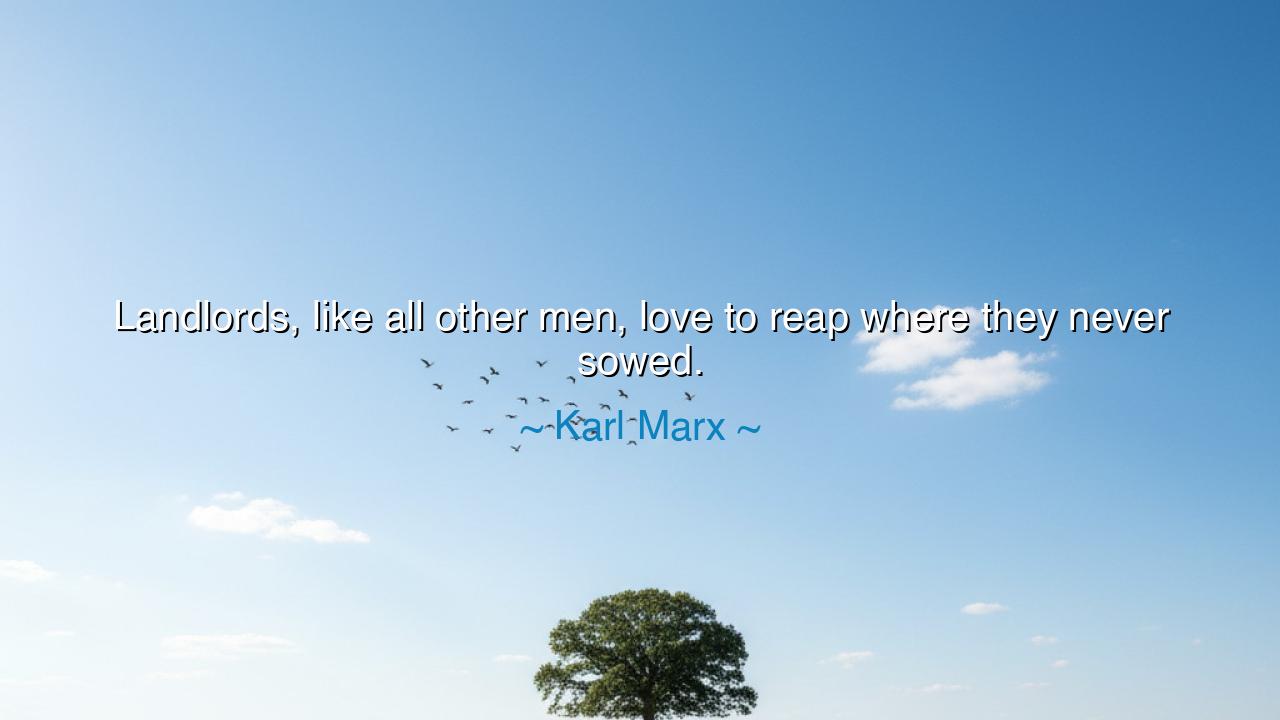
Landlords, like all other men, love to reap where they never






Hear the voice of the storm that shook the old world, the voice of Karl Marx, thundering across the ages: “Landlords, like all other men, love to reap where they never sowed.” In these words lies not merely anger, but revelation — a cry against the ancient injustice that has bound the laborer in chains while the idle grow fat from his sweat. It is a saying heavy with history, echoing from the fields of the oppressed to the halls of the mighty. It is the eternal struggle between those who sow the seed and those who reap the harvest, between the creators of wealth and those who merely possess it.
Marx spoke in an age when the soil of Europe was red with the toil of the poor. The Industrial Revolution had turned men into machines, women into shadows, and children into cogs. The landlord, in his eyes, was not merely the owner of property, but the symbol of a deeper corruption — of the human hunger to profit from the labor of others without sharing in their burden. To “reap where they never sowed” is to take the fruits of toil without ever touching the plow, to live in comfort upon the shoulders of those who struggle. And so this quote is not only a condemnation; it is a warning — that a world built on exploitation cannot endure forever.
From the dawn of civilization, the story has been the same. The pharaohs of Egypt, draped in gold, built their tombs upon the broken backs of countless slaves. The lords of medieval Europe feasted while peasants starved in the cold fields they themselves had planted. The pattern repeats through time — the few who own, and the many who labor. Yet even in these dark ages, the flame of justice was never fully extinguished. Every uprising, every rebellion, every cry for equality has been the echo of this same truth: that no man has the right to claim the harvest of another’s pain.
Consider, for example, the story of the Irish tenant farmers in the 19th century. They worked the land from dawn till dusk, yet the soil they nurtured was not their own. When famine came, their landlords — many of them far across the sea — demanded rent even from the starving. Crops withered, families perished, and ships laden with food sailed outward to foreign ports while Ireland’s children died. Was it not the very embodiment of Marx’s lament — men reaping where they never sowed? The harvest of greed had become a harvest of death. And yet, from that suffering arose a new spirit of resistance, the fire of land reform, and the cry for ownership and dignity among those who tilled the earth.
But let not the listener mistake Marx’s wisdom for mere bitterness. Beneath his rage burned a deeper vision — the dream of justice, where the dignity of labor is honored, and no man is robbed of the worth his hands create. He spoke not only against landlords, but against the human flaw that lurks in all hearts: the temptation to take ease in another’s struggle. It is a flaw as old as Eden, where man desired fruit without tending the tree. Thus, Marx’s words are both a social truth and a spiritual warning — for greed is not confined to the powerful; it lives in every soul that forgets the sacred law of labor and gratitude.
To sow is to give — to pour oneself into creation, to nurture what will one day nourish others. To reap without sowing is to steal the joy of creation itself. The wise know that no true prosperity can grow from injustice, for the soil remembers the tears that fall upon it. The harvest gained through exploitation may glitter for a season, but it is cursed at its root. The hand that hoards without labor withers in spirit, even as it fattens in flesh.
So, my children, let this be your lesson: Honor the work that sustains you. Whether you till the earth, build with your hands, or labor in thought, remember that the measure of wealth is not what you take, but what you contribute. Beware of the subtle comfort that comes from the toil of others — for it breeds decay of the soul. And if ever you are blessed with abundance, let your harvest feed more than your table. Share, uplift, and sow again in gratitude, that the circle of creation may remain unbroken.
For in the end, those who sow in truth shall reap joy, and those who reap without sowing shall harvest emptiness. The earth herself is witness to this law, and time, like an unending season, restores balance to all things. Let us, therefore, labor with humility, share with love, and build a world where no man must toil in chains for another’s ease — a world where the harvest belongs to the hands that bring it forth.






AAdministratorAdministrator
Welcome, honored guests. Please leave a comment, we will respond soon